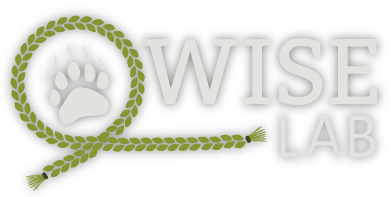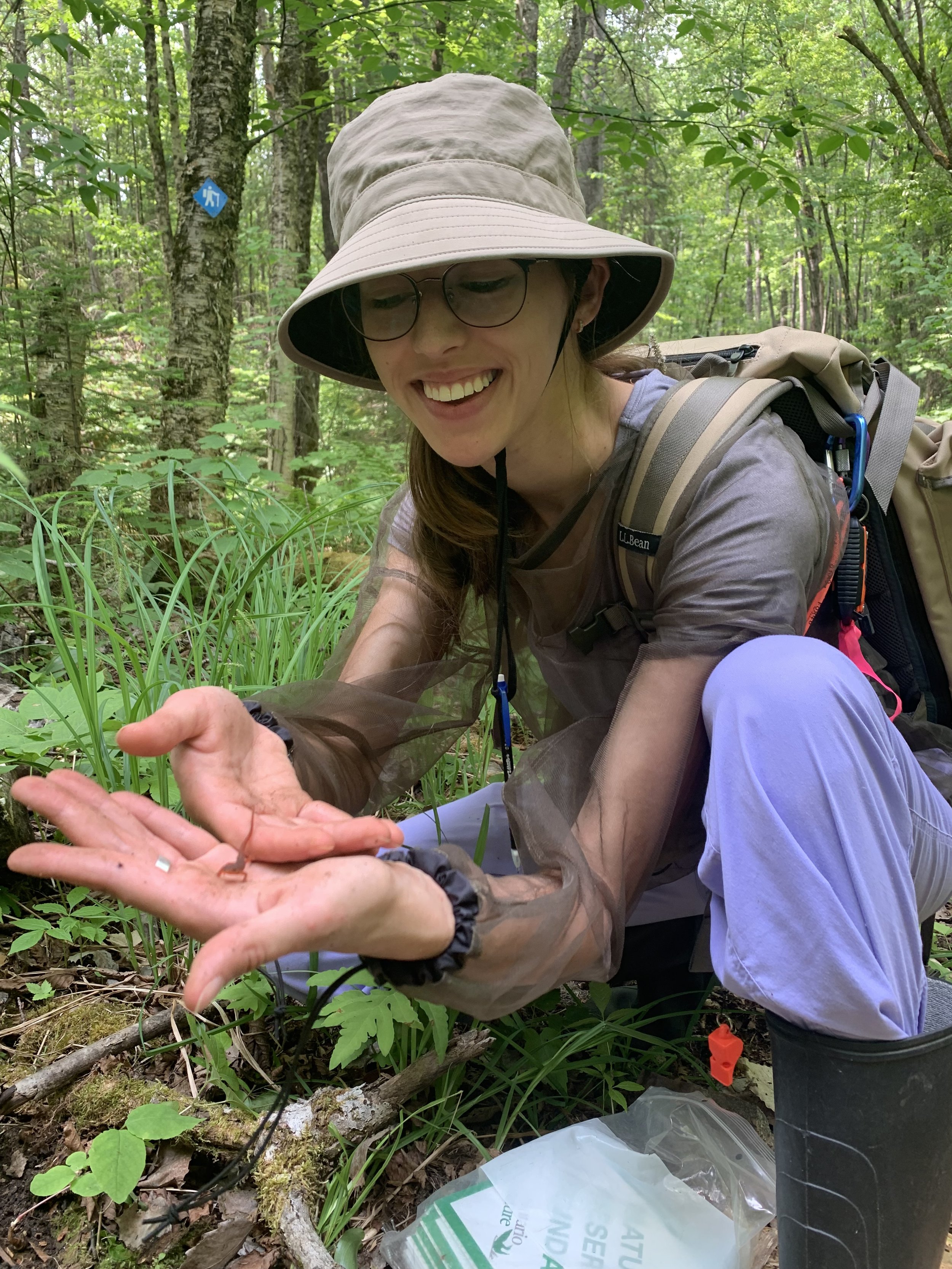Photo credit: Junaid Khan
Dr. Jesse N. Popp
Principal Investigator
Dr. Jesse Popp is a Canada Research Chair in Indigenous Environmental Science at the University of Guelph. She is a member of Wiikwemkoong Unceded Territory with Anishinaabe and mixed European heritage, and strives to promote inclusive science that embraces multiple ways of knowing while on her journey of learning and sharing. As the PI of the Wildlife, Indigenous Science, Ecology (WISE) Lab, she and her research team work to weave Indigenous and Western knowledge systems to contribute to the advancement of environmental and ecological science. Together, the WISE Lab team embraces holistic and transdisciplinary research approaches to investigate ecological research questions identified by the Indigenous communities and organizations that they partner with. Through Indigenous-led projects that uplift Indigenous values and ways of knowing, Dr. Popp and her team contribute to environmental caretaking and the progression of the natural sciences in the spirit of reconciliation.
Jessica Lukawiecki, postdoctoral fellow
Re-establishing healthy relationships to wild species
Jessica is a Postdoctoral Fellow of settler descent co-supervised by Dr. Jesse Popp and Dr. Susan Kutz. Jessica is a community engaged social scientist with a PhD in Geography at the University of Guelph. Her research explores the cultural significance of wild species to Indigenous Peoples, looking at options for reconciling endangered species laws with Indigenous rights and priorities, while amplifying Indigenous-led stewardship of wild species through Guardians Programs and Indigenous Protected and Conserved Areas (IPCAs).
Alice Dabrowski (she/her), PhD Student
Flower fly larvae taxonomy, outreach, and aphid control
Alice is a non-Indigenous Ph.D. student at the University of Guelph co-supervised by Dr. Jesse Popp and Dr. Andrew Young. Her research documents flower fly larval diversity and ecology in the eastern regions of Turtle Island. Her work aims to produce field guides for community science projects and develop low cost flower fly larvae options for aphid control in remote greenhouses. Beyond flower flies, Alice has a background in restoration ecology and environmental science. She hopes to support community environmental programs and facilitate capacity building.
Natasha Hirt (she/They), MSc student
Prioritizing Indigenous values and community outreach in species-at-risk plant-pollinator surveying
Natasha is a non-Indigenous M.Sc. candidate at the University of Guelph, co-supervised by Dr. Jesse Popp and Dr. Andrew Young. Her research is conducted in partnership with Wiikwemkoong Unceded Territory of Manitoulin Island, Ontario. Natasha is working alongside the community Species-At-Risk Program to develop a community-based pollinator monitoring protocol that prioritizes Indigenous ways of knowing and aims to reconnect youth with the Land. Working with community Elders and knowledge holders, Natasha is exploring pollinator relationships with medicinal and species-at-risk plants within culturally significant ecosystems in the territory.
Christopher Lim, MSc Student
Weaving knowledge systems in Ma’iingan (wolf) ecology on Mnidoo Gamii (Georgian Bay)
Christopher is a non-Indigenous person of diaspora, born and raised on Anishinaabe Aki. As an MSc candidate at the University of Guelph, he will be working with Anishinaabek communities of the Mnidoo Gamii (Georgian Bay) region on better understanding the spatial ecology of our Ma'iingan (wolf) relations on their territory. In engaging with this interdisciplinary project that entwines ecology and culture, Chris hopes to root his work in ideals of reciprocity, responsibility and kinship in supporting the resurgence of community, land, and all of Creation.
olivo Mehdi, MSc Student
Weaving knowledges for mooz (moose) monitoring and ecology
Olivo is a non-Indigenous person of diaspora who has grown up in Anishinaabe and Mushkegowuk territories. As an MSc candidate at the University of Guelph, he is working with Batchewana First Nation to monitor moose in important habitats using a two-eyed seeing approach. He looks to help support, promote the sharing of land between human and animal relatives in the face of ongoing environmental changes.
CLAIRE KEMP (SHE/HER), RESEARCH ASSociate
Land-based learning, re-establishing healthy relationships with wild species, & community-based moose monitoring
A recent graduate from the WISE Lab, Claire now works as a Research Associate. In partnership with Magnetawan First Nation, her MSc focused on prioritizing community-specific knowledge and values within biodiversity monitoring through the use of wildlife cameras. Her current role involves a combination of coordinating community-based moose monitoring, supporting Land-based learning initiatives, and collaborating with different Nations and organizational partners to work towards re-establishing healthy relationships with wild species.
Katherine (She/They), MSc Student
Assessing emerald ash borer impact on black ash stands
Katherine is a non-Indigenous M.Sc. candidate at the University of Guelph, co-supervised by Dr. Jesse Popp and Dr. Andrew Young. In partnership with the Wiikwemikoong Unceded Territory (WUT) Species-At-Risk Program, they are monitoring the spread of Emerald Ash Borer (EAB) among black ash. Through methods co-developed with the community, Katherine works to map and assess black ash stands, to help inform and support WUT’s efforts to steward this culturally significant species in the face of invasive species.
Part of the WISE Lab team - North American Caribou Workshop & Arctic Ungulate Conference 2023
Some of the WISE Lab team and our research partners enjoying time at the Cambridge Butterfly Conservatory (left) and having fun at the Indigenous Lands Symposium (right) in 2024
Former Lab members
Postdoctoral Fellows
Allyson Menzies (2021-2023) - Prioritizing Indigenous Knowledge Systems and Values in Environmental Monitoring
Kaitlyn Rathwell (2022-2023) - Prioritizing ethical space to support engagement among scientists and Indigenous communities
Ella Bowles (2019-2021) - Cultural Keystone Species in a Changing World
Research Associates
Pauline Priadka (2020-2021) - Weaving Indigenous and Western Knowledge to investigate moose population decline
MSC STUDENTS
Michelle Beltran (2023-2025) - Community-based Apakawaanaajiinh; Pashkwaanaajiinh (Bat) monitoring: Prioritizing Indigenous knowledge and values
Karl-Antoine Hogue (2022-2024) - Land Guardians and linear corridors: Weaving knowledge and prioritizing Indigenous values in Grey Wolf (Zhòh, Canis lupus) research in the North Boreal
Elena McCulloch (2022-2024) - Weaving knowledge systems to understand moose (mooz; moswa; Alces alces) winter habitat relationships
Claire Kemp (2021-2023) - Optimizing community-based wildlife monitoring: Prioritizing Indigenous knowledge and values
Kathryn Yarchuk (2021- 2023) - Bridging knowledge systems in moose ecology research
Heather Patterson (2020-2023) - Environmental and socio-cultural impacts of glyphosate-based herbicides: perspectives from Indigenous Knowledge and Western Science
Kyle Vincent (2020-2022) - Weaving Indigenous knowledge and western science to investigate the impacts of railways on
wildlife
MES Students
Zachary Carmona (2025) - Uplifting Indigenous approaches to caring for and monitoring the health of wild species
Anjuli Dabydeen (2024) - Re-Establishing Healthy Relationships to Wild Species
Alexandra Amos (2022) -Weaving Knowledge Systems for the Environment: An Ethical Online Space for Learning, Sharing, and Networking
Bradley Howie (2021) - Weaving Anishinaabe Science and Knowledge into the University of Guelph Arboretum
Undergraduate Honours students
Finn Pawlick-Potts (2024-2025) - Blanding’s Turtle Railway Monitoring
Chrystyn Jones (2021-2022) - Road vs Railway Mortality
Brittney Henry (2020-2021) - Persistence of Glyphosates in Ontario
Connor Nickel (2019-2020) - Elk Railway Spatial Ecology
Independent Study Students
Megan Gallant (2019-2020) - Climate Change: Indigenous Perspectives
Interns
Diandra Stacey (2019-2020) - Indigenous Gardens Intern
Raven Elwell (2019) - Indigenous Gardens Summer Intern
Research Assistants
Finn Pawlick-Potts (2023) - Indigenous Undergraduate Research Assistant
Juanid Khan (2022) - Weaving Knowledges for Environmental Research
Kaitlyn Raine (2021-2022) - Braiding Knowledge systems in a good way
Emma McNeill (2021) - Weaving Indigenous and Western knowledge to inform cumulative effects projections in the Ring of Fire
Mihar Raouf (2019) - Cultural Keystone Species and Indigenous Gardens
Volunteers
Sarah Hasenack (2021) - Weaving Ways of Knowing Website














